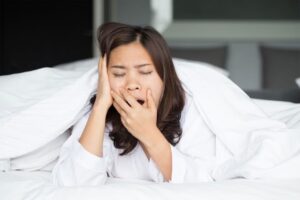Most people think of shutting your eyes as a universal necessity for sleep, but a sizable number of people sleep without closing their eyes completely. Called nocturnal lagophthalmos, this disorder can be due to an underlying problem or the natural shape of a person’s face and eyes.
Experts are unsure of how many people sleep with their eyes open, but their best estimate is 5% of the population. More recently, one study found that 4.5% of people with dry eyes had been diagnosed with nocturnal lagophthalmos. We explore why most people close their eyes to sleep, what causes some to sleep with their eyes open, and when to see a doctor.
Key Takeaways
- Eyes partially or fully open during sleep is called nocturnal lagophthalmos.
- Potential causes include weak eyelid muscles, nerve damage, and certain medical conditions.
- Sleeping with eyes open can affect eye soreness, dryness, irritation, and sensitivity.
- Treatment options like eye drops, eye masks, and surgery depend on the underlying cause.
Why Do We Close Our Eyes During Sleep?
Sleeping with eyes closed protects the eyes and keeps them from drying out. Another reason for sleeping with closed eyes is the impact light has on sleep. Exposure to light when one is meant to be sleeping can interfere with a person’s circadian rhythm, which impacts when they feel tired and awake. As a result, continual light exposure makes it more difficult to fall asleep and wake up at the right times of day.
What Causes You to Sleep With Your Eyes Open?
Underlying problems can cause people to sleep with their eyes open, but some people have nocturnal lagophthalmos due to the shape of their eyes or their face. Depending on the cause of their nocturnal lagophthalmos, people may sleep with one or both eyes open.
Specific issues that can cause someone to sleep with their eyes open include:
- An eye socket that is smaller than your eye
- Eyelashes that keep your eye propped open
- Injury or trauma to the face or eye
- Use of alcohol or sleeping pills
- Thyroid disease
- Tumors
- Cosmetic surgical procedures
- Diabetes
- Infection
- Neuromuscular diseases
- Bell’s palsy
Do Sleepwalkers Open Their Eyes?
Opening one’s eyes during sleep is a symptom of sleepwalking, but this is not the same as nocturnal lagophthalmos.
People with nocturnal lagophthalmos are sleeping normally and would keep their eyes closed, but something is preventing them from doing so. Conversely, research suggests that people who sleepwalk do so because of abnormal brain activity during specific stages of sleep.
How to Tell If You’ve Been Sleeping With Your Eyes Open
Even though someone with nocturnal lagophthalmos keeps their eyes open while sleeping, they are usually unaware of doing so and experience normal sleep. Many cases of nocturnal lagophthalmos are discovered by a partner or family member or when the person with the condition seeks treatment for their symptoms.
Sleeping with your eyes open can cause:
- Not feeling well-rested
- Eye soreness
- Dry, itchy eyes
- Watery eyes
- Eye discharge
- Difficulty opening your eyes
- Sensitivity to light
- Feeling like something is in your eye or under your eyelid
- Redness
- Blurry vision
Most people with nocturnal lagophthalmos find that their symptoms are worse in the morning, then get better throughout the day. However, others have few symptoms or symptoms that are worse later in the day.
Talking to Your Doctor About Sleeping With Your Eyes Open
Diagnosing nocturnal lagophthalmos usually requires examination by a specialist, but speaking to your doctor is a good first step if you notice any symptoms. However, the symptoms associated with the disorder are common and also associated with a variety of conditions, as well as poor sleep hygiene, so your doctor will probably ask you a number of questions to rule out other possible causes.
Treatment for Sleeping With Your Eyes Open
While nocturnal lagophthalmos does not always cause symptoms, it is best to keep your eyes closed while you sleep. Sleeping with eyes open can disturb sleep, cause eye damage, and even lead to vision loss. Treatment for sleeping with your eyes open varies depending on the cause, but minimally invasive options work for most people.
Treating Underlying Causes
In some cases, addressing an underlying cause can stop people from sleeping with their eyes open. Sometimes this requires lifestyle changes, such as no longer taking sleeping pills or drinking less alcohol. In other cases, medical treatment may be required.
Treating the Symptoms
When the cause of nocturnal lagophthalmos is unknown or untreatable, doctors might focus on treating the symptoms the disorder causes. For example, nighttime eye ointment and daytime eye drops can help reduce symptoms. In some cases, warm eye masks, warm baths, or aromatherapy before bed might help.
Tape and Weights
A common way to treat nocturnal lagophthalmos is by physically keeping the eyes shut at night. Taping the eyelids closed until morning might help, though this should only be done with your doctor’s approval. Small weights, usually made of gold, can also be taped to the eyelids to weigh them down.
Surgery
Some people may require surgery to treat their nocturnal lagophthalmos. Unless the surgery is related to treating an underlying condition, such as a tumor, it is usually to adjust the shape of someone’s eyelids or to implant a small weight.
References
Ask the Sleep Doctor
Have questions about sleep? Submit them here! We use your questions to help us decide topics for future articles, videos, and newsletters. We try to answer as many questions as possible. You can also send us an email. Please note, we cannot provide specific medical advice, and always recommend you contact your doctor for any medical matters.







